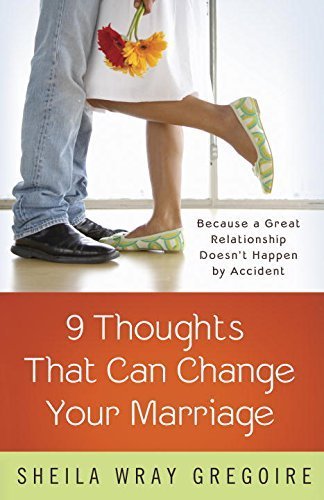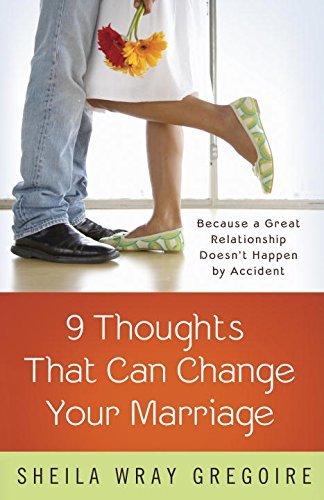Sheila Wray Gregoire's Blog, page 85
April 16, 2019
10 Things Economists Can Teach Us About Sex in Marriage
Is sex too expensive in your marriage?
Don’t worry–I’m not talking about prostitution! I’m actually talking about economics. Today, just for fun, I thought we’d take a look at sex in marriage from an economist’s point of view.
I actually ran this post a few years ago, but I absolutely LOVE it, and it never went very far. So I thought I’d run it again to see if it resonated with any of you!
I’ve taken Economics 101 five times in my life. Once in grade 12. Once in my undergrad. And then I had to take it again for my Master’s (they wouldn’t exempt me). Each time I learned exactly the same thing. Then, when my daughters were taking university courses online when I was homeschooling them, I went through the material first with Rebecca and then with Katie. I have Economics 101 down pat. Unfortunately that’s all I know.
But that obviously makes me eminently qualified to look at sex from an Economics 101 point of view! So let’s jump in.
Basic economics tells us that the “price” of something is where the demand for it intersects with the supply of it. The demand for something tends to increase when the price drops, while the supply tends to decrease when the price drops.
But what determines how much of a product will actually be supplied at each point? The cost of the inputs. So if you were making ice cream, for instance, and the price of milk dropped, then the supply line would shift, and the price of ice cream would decrease.
In the original gorgeous graph above that I made using Powerpoint, you can see that the demand and supply meet at 11 times per month. But what happens when an input cost drops? Suddenly more will be supplied at each price point, and bingo! You now have sex 13 times a month.
Okay, that may sound complicated. But I hope you get the picture: when inputs are more expensive, you’re going to get less of something, because people won’t buy as much at the higher price. That’s why if the government wants you to buy less of something they tax it (like gas or alcohol), but if they want you to buy more of something they give you a tax deduction (like charity).
What does this mean for sex?
It means that if the cost of sex gets too high, then you’ll have less sex.
So if you want to have great sex in marriage, we’ve got to keep the cost of inputs down!
Today, for Top 10 Tuesday then, I thought we’d look at the “cost” of 10 inputs into a great sex life in marriage, and see what we can do to reduce those costs!
I’m not talking about foundational things, like feeling good about sex and having a positive view of sex, or sex not hurting. These are necessary, too. Call them the factory–the thing that is necessary to even produce the product.
But then you have the inputs that go into it. You could feel great about sex and have a positive view of sex and still never want to have sex, because the cost of the inputs is just too high.
As you’re reading through this, pick just ONE or TWO things to work on. Don’t try to tackle all 10. Just pick the one that you think is most influencing the cost of sex in your marriage, and then decrease that! Here we go:
An Economic Look at the Inputs to Sex in Marriage
1. Having a place to make love
It’s hard to have sex if there’s not an obvious place where it will easily happen! That’s why it’s so important to keep the bedroom just to yourself, and to keep it feeling inviting and clutter free. If your children sleep in your bed, and you have to find another place to have sex, for instance, then the cost is much higher. If sex didn’t require the work of moving or going somewhere that isn’t as warm, then you’d likely have sex more often!
How to Lower the Cost: Clean your room. Move kids to their own beds. Buy some delicious bedding! Get a space heater or a fan if necessary.
2. Having time to make love
If one, or both of you, works shift work, then there isn’t an obvious “time” to make love like there is usually. Or if your schedules with kids, school, or work don’t line up, then it may be difficult to find a kid-free time when you’re both awake and energetic.
How to Lower the Cost: If evenings don’t work, can you start a morning routine? If it’s not work or school schedules, but simply lifestyle preferences, can you make a decision to go to bed at the same time anyway? If it is work or school, make a long-term goal to adjust your work or school schedules so that you have time alone together.
3. Having physical energy
It’s not just time together that matters; it’s time together when you’re not fighting desperately to stop from drifting off. When you’re exhausted, it’s harder to want to make love!
How to Lower the Cost: Try, as much as possible, to get at least seven hours of uninterrupted sleep a night. Help older babies, toddlers, and small children learn to sleep in their own beds. Look at the work that you do for the family and see if you can delegate it differently or cut some things out so that you don’t feel as bone tired.
4. Feeling physically well
Then there’s simply feeling well! If you’re afraid you’re going to puke, sex isn’t high on the list of things you’d like to do. That’s why pregnancy can make sex so tricky! But so can other ailments, like migraines, chronic pain, and more.
How to Lower the Cost: Decide that you will make a priority to take care of your health. Start an exercise routine, even if it’s just 15 minutes a day. Consult a nutritionist or do some research on how to eat better. Drink your 8 glasses of water a day to reduce headaches. If you have a specific health concern, speak to your doctor about how to manage it. Your body really matters; let’s treat it well!
Like this post so far? You should also check out:


Why Do I Never Want to Say Yes When My Husband Initiates?
5. Feeling emotionally replenished
For many of us, our need to have time to ourselves to rejuvenate, to think, to pray, or just to be relax is greater than our need for sex. That means that if you’re together at night, but you’ve had no time to rejuvenate during the day, you’re far less likely to want to have sex and far more likely to want to run a bubble bath, journal, or even take a jog.
How to Lower the Cost: Talk about your schedule and see if he can take some responsibilities off of your plate earlier in the evening so you can have some time to yourself. Make a practice of grabbing time during the day without feeling guilty. If you work, take your hour long lunch break to center yourself. If you’re at home with kids, take the nap time to relax rather than to get caught up on housework.
6. Feeling mentally calm
How can you have sex when your mind is going a mile a minute? When it comes to sex, multi-tasking is a woman’s greatest enemy. And when we can’t turn off our brains, it’s hard to turn on our bodies.
How to Lower the Cost: Pick a time earlier in the day when you go over your to do list for the next day. Go for a walk after dinner and talk to your husband about the things that are on your mind. Help clear your head before evening comes.
7. Feeling good about your body
If you hate your body, it’s hard to think about your body. And if you can’t think about your body, it’s hard to focus on it enough to get aroused! So how we feel about our bodies affects our tendency to want to have sex.
How to Lower the Cost: Dress your body well and take care of your appearance during the day. Fight the frump! Do lots of stretching and enjoying your body. Ask your husband what his favourite parts of your body are–and believe him.
8. Feeling emotionally close to your husband
Who wants to have sex if they don’t feel close? You need to feel like you’re connected emotionally before you want to be connected physically. Like I said in The Good Girl’s Guide to Great Sex, Men make love to feel loved, whereas women need to feel loved to make love.
How to Lower the Cost: Spend time everyday sharing about your high and low of the day. Use some of my conversation starters to start talking again. Find a hobby to do together. Or enroll in my FREE 5-lesson emotional reconnection course.
9. Trusting your husband
For a woman to enjoy sex, she has to be able to be totally vulnerable. She can’t be vulnerable, though, if she doesn’t trust him, either because he’s used (or is using) porn, or he’s texting other women, or he’s being emotionally or physically abusive, or he’s had an affair.
How to Lower the Cost: The only way to deal with these big things are to confront them. With most of these things, you will need outside help. They will not get better without you drawing healthy boundaries and you both learning together how to rebuild trust and treat each other well. My book 9 Thoughts That Can Change Your Marriage talks about this.
10. Enjoying your husband’s scent
Here’s the last one, which those of us with husbands with good hygiene often take for granted: we need a guy who doesn’t stink. And I get email upon email every week from women whose husbands don’t shower enough or don’t brush their teeth. How, then, are they supposed to want to make love?
How to Lower the Cost: Many of these women are looking for “nice” ways to tell their husbands their hygiene is bad. I’m not sure there is a nice way. I think sometimes you just have to say it: “I’d love to make love, but soap and toothpaste are the best aphrodisiacs, and they come before foreplay.” You can even make it a routine that every night you shower together or you brush your teeth at the same time. But beating around the bush and hoping that it changes won’t do any good!
So there you go–10 inputs into sex that we all need.
Which one is the most “expensive” for you? Which one do you have to lower? Or did I miss one? Let me know in the comments!
Are you TIRED of always being too tired?

Do you yearn to actually WANT to make love–and figure out what all the fuss is about?
There is a way! And in this 10-module course I take you through what libido is (it may surprise you!), what affects libido, and how we can reclaim the excitement that God made us for.
Take me to it!
Author
Social Media
Sheila's Best Posts
Books
Courses
Freebie
 Sheila Wray Gregoire has been married for 27 years and happily married for 22! She loves traveling around North America with her hubby in their RV, giving her signature "Girl Talk" about sex and marriage. And she's written 8 books. About sex and marriage. See a theme here? Plus she knits. Even in line at the grocery store.
Sheila Wray Gregoire has been married for 27 years and happily married for 22! She loves traveling around North America with her hubby in their RV, giving her signature "Girl Talk" about sex and marriage. And she's written 8 books. About sex and marriage. See a theme here? Plus she knits. Even in line at the grocery store. Find Sheila Here:
Find Sheila Here:YouTube
Sheila's Favorite Posts on To Love, Honor and Vacuum:
10 ways to initiate sex
10 Effects of Porn on Your Brain, Marriage, & Sex Life
Why So Much Marriage Advice is So Trite
How can Sex be Hot and Holy at the Same Time?
Check out some of Sheila's Books:
The Good Girl's Guide to Great Sex
31 Days to Great Sex
9 Thoughts That Can Change Your Marriage
To Love, Honor, and Vacuum
Check out Sheila's Courses:
The Boost Your Libido Course
The Whole Story: Talking to Your Daughter about Sex, Puberty, and Growing Up
The FREE Emotional Intimacy E-Course
Are you ready to take your marriage to the next level?
Sign up for our emails and get access to the TLHV free marriage and parenting resource library. We have over 25 downloads and are constantly adding more. Sign up here!
April 15, 2019
Do I Have to Indulge My Husband’s Fantasies?
If your husband wants you to do a striptease or send him sexy photos, doesn’t that mean he’s perverted? Do you have to indulge him?
Every Monday I like to post a reader question and take a stab at answering it, and I found one from a few years ago that I thought was important to rerun, especially since we were talking about porn last week. So I have two women with similar questions about how much of a guy’s fantasy we have to submit to.
One woman writes:

Reader Question
My husband wants me to send him naked photos to him while he’s at work. I really feel uncomfortable and harassed by this situation and think it’s getting out of control.
We’re in our forties and have been married for over 20 years. Our relationship isn’t very good as I always get thrush every month.
If I don’t send the photos he ignores me and blanks me out. I told him I don’t love him anymore and to get out of my life but he will not listen to me. He always says he’s sorry and then makes up but then he’ll start all over again.
Another woman asks more of a philosophical question:

Reader Question
I equate my husband’s asking me to wear uncomfortable and unattractive lingerie as well as perform lap dances and strip dances as an overt and palpable manifestation of his fantasies. Men do this without question using the mantra that “men are visual“. And as wives, we are required to satisfy those visual fantasies. No matter that they arise because he has seen something on TV or in a magazine or in a movie (or even porn) that has caught his eye. And no matter that they are very uncomfortable for the wife to perform. When the husband watches the wife, he is fantasizing about the image he has see that prompted the performance, not the wife. That is overtly forcing the wife to participate in his fantasy. It is very hurtful to know that your spouse is fantasizing about some obviously hotter, sexier image and even more hurtful to have to perform it. Somehow, this is viewed as normal male behavior.
All right, let’s try to unpack this, because I think there are several issues at play, and I want to tease them out separately.
Ready? Let’s go!
Being Treated Like a Sexual Object is Wrong
The first letter writer is really concerning to me. He’s asking her to do something which is potentially harmful to her–how does she know other people won’t see those photographs? And why is he more interested in seeing naked pictures of her at work than he is at working on their relationship when he’s at home?
As I’ve said before, sex is supposed to be mutual, and when we treat sex like it’s all for him and that women need to do whatever he wants, we diminish the power of sex to bring us together as a couple. We make sex into something which only physical–animal even–instead of something which is also intimate.
That is so harmful to the marriage and to the woman’s libido. You should not be treated like a sex object.
I guess what I’d say to this woman is that she needs to decide what she wants. She isn’t drawing very good boundaries. He blows up at her, she blows up at him and says it’s over, he apologizes–and she takes him back.
If someone is truly sorry, they will confess to someone else, get accountability, and change their behaviour. Sometimes the worst thing we can do is to rush forgiveness before we give God time to work on the person’s heart.
The husband here has issues where he’s not valuing the wife; he sees sex as only physical; and he violates her personhood. He needs to start feeling the consequences of his actions, and I’d recommend reading Boundaries in Marriage or my book 9 Thoughts That Can Help Your Marriage to help you sort out how to resolve something like this and refuse to participate in him going down a dangerous sexual path.
Like this post so far? You should also check out:

Pastors: Enough with the “Boys Will Be Boys”

Men Are Visual: Does That Mean All Men Lust?
Enjoying Watching Someone Is Not Wrong or Abnormal
Okay, so I obviously agree that a husband wanting the wife to indulge a fantasy where she is objectified–when there is no intimacy in other parts of their relationship–is absolutely wrong.
If this is the case in the second letter writer’s situation, then I would give the same advice to her.
However, I do see some red flags in the second letter that I want to address. She’s making some very blanket statements that I see frequently that are not necessarily true. They may be true in her own marriage, but they aren’t necessarily true.
She writes:
…asking me to wear uncomfortable and unattractive lingerie as well as perform lap dances and strip dances as an overt and palpable manifestation of his fantasies. Men do this without question using the mantra that “men are visual”.
If a guy wants you to perform lap dances all the time, and if sex is really focused on him being served rather than being something intimate, then this is definitely wrong.
But many men ARE visual (some women are, too!), and the fact that a guy would enjoy watching a woman do a lingerie fashion show or watching her slowly take off her clothes does not mean that he has porn issues or that he’s a pervert. He may just love you and enjoy being with you and want to have some fun!
Just Because Strippers Do Something or Porn Stars Do Something Doesn’t Mean it’s Necessarily Off Limits
There are some acts that definitely are wrong–anything involving a third party, watching porn together, role plays which are really odd (acting like a child, etc. etc.), some physical acts that are harmful. But that doesn’t mean that everything a stripper does or everything a porn star does is wrong. Of course, I hope you haven’t all been in strip joints or watched porn to figure out what those things are, but hopefully you know where I’m coming from!
I think we need to be careful, then, that we don’t assume that because a husband may want to spice things up or because he may want to look at you taking your clothes off that he’s by definition a gross porn addict.
The letter writer says, for instance:
When the husband watches the wife, he is fantasizing about the image he has see that prompted the performance, not the wife.
This may very well be the case, especially for this woman. I’ve written before, for instance, that it’s okay to say to him, “I’m not going to have sex with you after you’ve gotten aroused watching Game of Thrones.” And if your husband wants something you think is gross, that may indeed be a red flag.
But when a husband watches a wife do a little striptease it doesn’t mean he necessarily is fantasizing about something else. Most guys enjoy watching a women getting undressed. That doesn’t mean he’s bad. Most guys would love it if we tried some new positions or did some interesting things.
One thing I often advise couples to do is the “His Night” “Her Night” bargain. Take the Saturdays in a month and declare two of them “His nights” and two of them “Her nights”. On his nights you do the things he wants, and on her nights you may start with a long, drawn out massage. That way if he likes seeing a lingerie fashion show, you can provide one. But on all the other nights you just do things regularly, so you don’t have to feel pressured that every night has to be a big production. He knows he gets what he needs sometimes, and you know you do as well.
Need an easier way to have these conversations?

31 Days to Great Sex guides you through exercises so that you can talk about libido, frequency, intimacy, in a low-stress, easy way.
No blaming. Just solutions–and a whole lot of fun!
Let's try it!
The Issue is the Heart. Always.
Some men, because of past or current porn exposure or the way they allow themselves to think, do view sex as primarily a physical thing where they can get their own needs met, rather than as an intimate encounter where they please the wife and feel close to her, too.
If that is the case in your marriage, then absolutely you need to talk to him about it. You may even need to bring in a third party, like a counsellor or mentor couple, to help you draw some boundaries and say, “no more”. You may have to get something like Covenant Eyes to make watching porn more difficult and give him some accountability.
But sometimes we become so focused on the evils of porn that we think anything that is the least bit risqué is therefore off limits.
The issue is not the act; the issue is the heart.
The closer a couple gets to each other and the more intimate they become, often the more passionate and more fun their lovemaking grows. Hot and holy can go together!
If you have a history of people using sex as a weapon against you, or if you’re just completely grossed out by our culture, it’s easy to start seeing sex as something distasteful that we need to get through–a sort of “missionary position is the only acceptable thing”. But it’s not. And let’s be careful that we don’t throw passion out the window with our attempt to get rid of the influences of pornography.
What do you think? How would you tell the difference between a guy who just enjoys looking at his wife and a guy who wants his wife to indulge fantasies he’s fuelled by porn? Let’s talk in the comments!
Marriage Shouldn’t Be BORING!

10 Ways to Tell Your Husband What You Want in Bed


10 Sexy Questions to Ask Your Husband

10 Ways to Signal Yes to Your Husband
Author
Social Media
Sheila's Best Posts
Books
Courses
Freebie
 Sheila Wray Gregoire has been married for 27 years and happily married for 22! She loves traveling around North America with her hubby in their RV, giving her signature "Girl Talk" about sex and marriage. And she's written 8 books. About sex and marriage. See a theme here? Plus she knits. Even in line at the grocery store.
Sheila Wray Gregoire has been married for 27 years and happily married for 22! She loves traveling around North America with her hubby in their RV, giving her signature "Girl Talk" about sex and marriage. And she's written 8 books. About sex and marriage. See a theme here? Plus she knits. Even in line at the grocery store.
 Find Sheila Here:
Find Sheila Here:
Facebook
Twitter
Instagram
YouTube
Pinterest
Sheila's Favorite Posts on To Love, Honor and Vacuum:
10 ways to initiate sex
10 Effects of Porn on Your Brain, Marriage, & Sex Life
Why So Much Marriage Advice is So Trite
How can Sex be Hot and Holy at the Same Time?
Check out some of Sheila's Books:
The Good Girl's Guide to Great Sex
31 Days to Great Sex
9 Thoughts That Can Change Your Marriage
To Love, Honor, and Vacuum
Check out Sheila's Courses:
The Boost Your Libido Course
The Whole Story: Talking to Your Daughter about Sex, Puberty, and Growing Up
The FREE Emotional Intimacy E-Course
Are you ready to take your marriage to the next level?
Sign up for our emails and get access to the TLHV free marriage and parenting resource library. We have over 25 downloads and are constantly adding more. Sign up here!

 Marriage isn't supposed to be blah!
Marriage isn't supposed to be blah!
Sex is supposed to be stupendous--physically, emotionally, AND spiritually. If it's not, get The Good Girl's Guide to Great Sex--and find out what you've been missing.

April 12, 2019
Confessions of a Female Porn Addict
For the last few weeks, I have been writing about how we need to change the way we talk about sex in church; sex is not just for men, but for women as well. However, the same applies to porn. It is not just men who are getting addicted to porn, but women as well. Nevertheless, we say porn is “Every Man’s Battle” and don’t acknowledge the battle that many women are fighting on their own in secret.
Today Beth Nyhart, author of Rend Your Heart & Not Your Garments is going to talk about her past struggles as a female porn addict.
Here’s Beth:
If you met me at 16, you would have seen a tall red-headed girl who had been homeschooled her whole life.
As we talked you might have learned that I loved music and drama, that I wanted to be a missionary when I grew up, and that church was a second home to me.
I doubt you would have been able to guess that I was addicted to pornography.
In the early 2000s my youth group was all about purity culture. Teen girls wore silver rings and wrote letters for their future husbands to open on wedding nights. We learned to kiss dating goodbye, and that saving yourself for marriage was a pivotal part of being a Christian.
I’m not saying that any of that was bad. But it didn’t help me.
When the topic of pornography came up it was addressed to the boys, because everyone knew that men are sexually stimulated visually. The girls were taught about modesty and finding our emotional fulfillment in Jesus. I sat through these teachings nodding and taking it in but all the while feeling like something must be wrong with me. It seemed like I was a deviant foul-hearted freak of nature sitting in a group of innocents. If nobody taught girls about porn that meant girls weren’t supposed to be dealing with porn. I was obviously the only one.
That’s a lie.
I can catch them more easily now that I’ve had a decade of practice. Satan has whispered that lie in the ear of so many young women who look around wondering if anyone can help them, then lower their eyes in shame. The accuser taunts, “No one can help you, if they even knew about you they’d be disgusted. They think you are a good example to the other girls, but if they knew what you were doing last night you’d never show your face here again.”
My double life started at the age of 8 when I was first introduced to pornography and it continued until I was 18 and finally found a way to confess my sin and get help. One of the characteristics of pornography is that as you indulge in it, the compulsions escalate. Your body develops a threshold to what you are feeding it and you find yourself needing a harder hit. In porn terms that means it needs to be more degrading; more taboo. And you’d better believe that Satan is on board with inventing new lows as our addiction-ridden brains need stimuli. This is one of the reasons that PornHub’s 2018 year in review stats show that the most searched for types of porn are homosexual, underage, incestuous, violence, animated, and porn with multiple participants. If you are wondering why animated is on that list, it’s because the human body has limitations, but animation opens up a world of disgusting possibilities.
Another one of Satan’s lies is that getting married will solve the problems you have with lust. But as you cultivate a desire for pornography and train your body to become aroused by the variety of porn out there, what you are doing is creating desires in yourself that a monogamous marriage relationship will never be able to fulfill. Just being allowed to have sex isn’t enough when you’ve rewired your brain and body to respond to pornography.
I was caught in what I call a sin/confess cycle.
I would indulge in pornography and then feel such shame that I’d cry out to God in desperation. I prayed that He would change me, take this temptation away, or fix whatever was broken inside of my body. Over and over again He would give me the same answer: confess.
Confess. Not just to God, but to another person. Admit out loud what I had been doing and that I needed help. That was unthinkable. I could never in a million years confess this sin.
But God has a way of driving us down to the end of ourselves and forcing us to face what He asks of us. After years of emotional and spiritual turmoil I knew that this was never going to go away on its own. I started praying that God would give me the strength to obey Him in the act of confession, and He was faithful to provide for me.
My temptations didn’t go away overnight.
I had 10 years of habits to unlearn, I had a relationship with the Holy Spirit that was old and new at the same time. I had to re-internalize the basics of Christianity that hadn’t been able to impact my heart before in quite the same way. But I surrounded myself with people who knew my struggle and were willing to walk through it with me, and I thank God for them every day.
Sin is the same across the board, though the earthly consequences may vary (There are amazing Christian therapy and recovery programs for people who are dealing with addictions). The woman struggling to contain the bitterness in her heart and the woman struggling to control her sexual urges are both separated from God by their sin. And both of them need to deal with it!
The basics of how to deal with sin are:
Come to God with a broken and contrite heart over your sin (Psalm 51:17)
Ask Him to provide everything you need to live a godly life, which when dealing with sin is the right opportunity, person, and strength to confess and repent (2 Peter 1:3)
Obey God in the act of confession (James 5:16)
Accept the forgiveness that He offers you through the blood of Jesus Christ (Ephesians 1:7)
Surround yourself with other believers who will walk with you, hold you accountable, and encourage you (Ecclesiastes 4:9-12)
Daily allow the Spirit to transform you by renewing your mind (Romans 12:1-2)

The thing about sin is that we are all universally unable to handle it in our own willpower.
We need God to do all of the work for us, and only by surrendering to His work in our hearts are we conformed into the likeness of Christ.
As I speak and write about sin, my heart’s desire is to invite people to come out of the darkness and into the light. God has so much for us, so much peace and purpose that He generously lavishes on us. But so many people spend their lives ensnared in sin and unwilling to let go of it. Satan might be telling you that your sin isn’t that big of a deal, or he might be telling you that your sin is the worst ever and nobody can find out. But either way, he is wrong.
Your sin is common. Unextraordinary. The typical fallen human experience. I’m not afraid or impressed by the depth or the breadth of it. Your sin is rotting your heart, keeping you from true fellowship with God, and hurting your church body every day you don’t deal with it. And your sin is completely 100% deal-with-able.
Don’t wait another moment to come to God with your hands high in surrender. Turn yourself in and trust your soul to the One who is in the business of redeeming weakness for His glory.
About the author
Social Media
Beth’s Books
Best of Beth’s Blog
 Beth Nyhart, Author of Rend Your Heart & Not Your Garments.
Beth Nyhart, Author of Rend Your Heart & Not Your Garments.Beth Nyhart is a Christian leader, business owner, wife, mother, and a recovering porn addict. God is redeeming her story as she uses it to educate churches about how to confront the sin nature in every member of the congregation.
Connect with Beth on Facebook, Instagram, or Twitter!
 Rend Your Heart & Not Your Garments: A Heart-felt Plea to the Church Filled with Secret Sin
Rend Your Heart & Not Your Garments: A Heart-felt Plea to the Church Filled with Secret Sin
Secret sin is an epidemic in the church, and it’s time we learned to address it. Get your copy here!
5 Secret Sins That Are Ruining Your Church
Every human being is born with a sin nature, and the majority of us walk around on earth trying to hide it from each other. It’s a little silly if you really think about it. Something we literally all deal with on a daily basis that is in an outright war with the Spirit of God within us, and we like to pretend we have it all under control?
Read the post on my blog!
April 11, 2019
Modesty Revisited, Wedding Vows, and More!
Do we look at modesty all wrong? Is orgasm really necessary?
It’s time for a new episode of the To Love, Honor and Vacuum podcast! And we’re dealing with a whole lot of different things today!
I hope you all will listen, but if you don’t have time, I’ll have some links and rabbit trails below so you can read all you want as well!
And consider this podcast “extras”. If you want to go deeper into what I talked about in the podcast, here are some more things to help you.
But first, here’s the podcast:
Main Segment: Is Don’t Be a Stumbling Block the Proper Modesty Message?
Recently the modesty debate blew up again because a mom wrote an open letter asking the female students at Notre Dame, where her son studied, to stop wearing leggings because it’s so distracting.
Of course, everybody started the whole “are leggings pants?” debate again, and I really don’t want to comment on that. But I thought it was worth reiterating what I’ve already said about modesty, because it was an important post, and not everybody has read it. So I decided to base this week’s podcast on the post. Since some people prefer podcasts to posts, I thought it might reach a new audience.
If you haven’t read how “Don’t Be a Stumbling Block” is the wrong argument, you can do so here!

From Why 'Don't Be a Stumbling Block' is a Really Bad Modesty Message:
We think of the “weaker brother” as being one who is more susceptible to sin. That is NOT who Paul considers the weaker brother. In this case, Paul calls the “weaker brother” the one who does not have as much knowledge and the one who is not as mature in the faith.
In many cases, teenage girls are being asked to change what they wear for the sake of adult men who are pastors, elders, even family members! When I was on Up for Debate radio on Moody recently talking about modesty, this scenario was presented:
What do we do when a woman who is seeking walks into church wearing something really inappropriate, like a skimpy sundress? How do we tell her that she’s a stumbling block?
My response: You don’t! Because in this situation, SHE is the weaker brother. The men are more mature in the faith. It’s her faith that God is most concerned with. He leaves the 99 to find the 1.
What if setting a modesty dress code actually becomes a stumbling block for women because it weakens their faith?
Millennial Marriage: The Traditional Vows Matter!
There’s a whole new trend to write your own wedding vows, and Rebecca and I are pretty adamant that the traditional ones matter. If you want to write your own, that’s fine, but say them IN ADDITION to the traditional ones. I once knew a couple that wrote lovely vows, but at the end of them, I realized they had forgotten anything remotely like “forsaking all others”. That’s kinda important.
I was talking about an article in Brides magazine with advice on writing your vows, which I find a little silly. “Don’t say always or never!” (Isn’t that what a vow is?) And I do think that weddings should be sacred, too.
Anyway, I’d love to hear what you think in the comments! And here are Katie and David’s vows, by the way (they said the traditional ones, and then they pledged specific ones that they wrote after–at around 9 minutes). And you may recognize the preacher here–he was in the picture of the team of us who went on the marriage retreat last weekend! He’s Tammy’s husband, Steeve, a chaplain in the Canadian military.
Reader Question: Is Orgasm Really Necessary?
A woman wrote in with this complicated question:
My husband feels that I’m depriving him of something vital if I don’t orgasm during sex. I’ve never faked an orgasm.I do wiggle around a lot and fake being sexually aroused, because he likes noisy sex, and it makes him orgasm faster. He seems to accept that as an indication I’ve enjoyed myself. I don’t tell him any different. The truth is, sex for me is no longer about chasing orgasms. Also, I can’t physically handle that level of stimulation anymore. I used to be very heavy, and everything was protected by layers of fat and skin. Now I’m thin, and everything is exposed, so to speak. So my question is this: is female orgasm required in order for a couple to have good sex? Should a female make an effort to orgasm merely to please her partner? My personal feeling on it is, the man always orgasms, so he gets what he wants. What’s the big deal if I don’t want the same thing? It’s not like HE can feel it.
Wow. A lot to process there. Two quick things: Don’t ever fake it. Ever. And not just don’t fake orgasm; don’t fake arousal, either. It doesn’t do you well in the long run, and it hinders intimacy. Sex is supposed to be a deep knowing; if you’re pretending, he can’t know you. And if you fake long enough, you’ll end up resenting him and resenting sex.
Finally, if your body has changed, maybe it’s time to figure out how to make sex work again? It CAN feel good–you just may need to try some things. And it’s worth it! 31 Days to Great Sex can take you step-by-step through rediscovering what feels good, and that may be a good idea for you.
Need an easier way to have these conversations?

31 Days to Great Sex guides you through exercises so that you can talk about libido, frequency, intimacy, in a low-stress, easy way.
No blaming. Just solutions–and a whole lot of fun!
Let's try it!
COMMENT: Drawing boundaries works!
A great comment left this week after our post about speaking up when something is wrong in your marriage. She writes that when she started speaking up and drawing boundaries, her husband actually became far less harsh. Such an important point!
I felt like that for most of our 15 years of marriage, and even though I know my husband is a good guy, his harshness had really worn away at the intimacy of our marriage. I always felt like I was a kid in trouble and I hated that dynamic. I FINALLY went to counseling this year and she told me to ready Boundaries by Cloud & Townsend. Holy game changer!!! I highly recommend it. The next time he got upset with me (the kids’ messy game closet) I calmly said, “You may not talk to me like that. If this is really important to you, you can come find me and talk to me when you’re calm.”
And I walked away. Well guess what? He cleaned it up himself, then came and found me and apologized for his temper. I only had to call him out one more time, and he hasn’t been harsh with me in 3 months! I never thought this was possible. And the intimacy in our marriage is better than ever. We are having deep conversations and I feel like he is my “safe place” again. So don’t give up hope. God really can heal these hurts. But sometimes we have to let our husbands feel the consequences of their actions instead of absorbing all of the negativity ourselves.
Love that! Treat others with respect, but also treat yourself with respect. Don’t accept disrespectful behaviour towards yourself, or you’re enabling sin.
A Better Way to Honour God in Your Marriage:

Are You a Spouse or an Enabler?

When Your Husband Won’t Change: Is this the Last Straw?
That’s it for today! Hope you enjoy the podcast, and do listen in! And remember to rate it and leave a review, so other people will see it.
Anything stand out to you today? Let’s talk about it!
Author
Social Media
Sheila's Best Posts
Books
Courses
Freebie
 Sheila Wray Gregoire has been married for 27 years and happily married for 22! She loves traveling around North America with her hubby in their RV, giving her signature "Girl Talk" about sex and marriage. And she's written 8 books. About sex and marriage. See a theme here? Plus she knits. Even in line at the grocery store.
Sheila Wray Gregoire has been married for 27 years and happily married for 22! She loves traveling around North America with her hubby in their RV, giving her signature "Girl Talk" about sex and marriage. And she's written 8 books. About sex and marriage. See a theme here? Plus she knits. Even in line at the grocery store. Find Sheila Here:
Find Sheila Here:YouTube
Sheila's Favorite Posts on To Love, Honor and Vacuum:
10 ways to initiate sex
10 Effects of Porn on Your Brain, Marriage, & Sex Life
Why So Much Marriage Advice is So Trite
How can Sex be Hot and Holy at the Same Time?
Check out some of Sheila's Books:
The Good Girl's Guide to Great Sex
31 Days to Great Sex
9 Thoughts That Can Change Your Marriage
To Love, Honor, and Vacuum
Check out Sheila's Courses:
The Boost Your Libido Course
The Whole Story: Talking to Your Daughter about Sex, Puberty, and Growing Up
The FREE Emotional Intimacy E-Course
Are you ready to take your marriage to the next level?
Sign up for our emails and get access to the TLHV free marriage and parenting resource library. We have over 25 downloads and are constantly adding more. Sign up here!
April 10, 2019
The Micah 6:8 Marriage: Finding the Balance Between Mercy and Justice
What’s the best way to grow towards intimacy with your husband?
Hint: that’s a trick question.
There’s actually not a correct answer to that question, because there’s not a universal BEST way. There is only what God would have you do, in this particular moment. And that may vary for different marriages, and even over the years for your own marriage.
I’m not saying that truth is relative, by the way, or that sin is ever okay. I’m only saying that the right thing to do is highly contingent on what’s going on in your marriage at the time, and in what God is doing behind the scenes. And that’s not always straightforward.
Let me explain with a story, and then with a verse.
This month on the blog we’re looking at how small changes can make big differences in a marriage. I started out last week looking at how it’s important to speak up when something is bothering us, and to do something about it if our spouse is underfunctioning. I gave an example from the book Mended that I had read, where the husband would go to a potluck at church and do the rounds, talking to everyone, and routinely leave the wife responsible for corralling all four kids on her own.
Then I suggested that what she could do is leave the kids with him at the next potluck, so that he would experience what that felt like. That suggestion made sense to me, because I had read the book and knew everything that led up to this (his workaholism; his being warned by friends and pastors that he was neglecting his family; his wife trying to bring up issues to no avail). But doing that out of left field would be major escalation, and likely not a good idea. There are several steps that would be better to do first, like talking it through, trying to manage the kids together, etc.
At the same time, when a husband has never looked after all of the kids, and routinely ignores the kids when in public with his wife, and this has been a chronic problem which he refuses to address, I do think that her taking some drastic steps to show him what it is like, and to refuse to go out to public events anymore may be warranted, for her own sanity.
So how do you tell when you should do something mild, and how do you tell when you need firmer boundaries?
That’s where Micah 6:8 comes in! The verse says:

Micah 6:8
He has shown you, O mortal, what is good.
And what does the Lord require of you?
To act justly and to love mercy
and to walk humbly with your God.
Okay, so we’re to act justly–to do what is right and good and which brings about God’s kingdom on earth–but we’re also to love mercy, which means foregoing justice at times and forgiving offences.
Notice how these two things are in opposition to one another?
Act justly says that we are to pursue God’s justice. Love mercy means that we are to forgive and excel in kindness and generosity.
That’s why the last bit of the verse is actually the most important: You’re to walk humbly with your God.
To walk with God means that God is ever-present in your daily life. Throughout the day, your mind and heart are focused on Him. You think about the things of God. You read Scripture and pray. You try to walk in Jesus’ footsteps.
But you do this with a certain attitude: humility. You don’t walk with God assuming that you know all the answers. You don’t regard God as a Santa Claus, that you can just appease and then He’ll give you what you want. No, you’re humble, realizing that He is God and you are not, and His thoughts are not as your thoughts. He is above you. Thus, you need to listen to God, not dictate to God.
The only way that you can find the balance between justice and mercy in your marriage is to walk humbly with God, because He may want you to do things that He is not asking a friend of yours to do. He may want you to bear up with some problems for years as God works on your husband’s heart. Or He may want you to take action sooner, to allow your husband to feel the consequences of his actions, because only then will your husband be motivated to change.
We often get the balance between justice and mercy backwards in our marriages.
Many people, in the little things in marriage, and in the early years of marriage, lean too heavily on the justice side. They become angry at their spouses very easily. They assume that their spouses are deliberately hurting them, rather than simply being clueless about how you see the world. They become disdainful when the spouse doesn’t meet their expectations, which are usually unrealistic anyway. And this builds a distance between them that could have been forged if people just learned how to be kind to one another, believe the best, and bring things up in a way that doesn’t heap blame and guilt but instead just shares our heart.
On the other hand, when crises hit a marriage, and when a spouse is truly behaving badly, many people lean too much on the mercy side of the equation. We’re so scared the marriage is going to fall apart that we’re willing to overlook just about anything if it can just keep the marriage together. We’ll turn ourselves inside out, seeing how we can change ourselves and be nicer, rather than taking a step back and letting the spouse reap what he or she sows. In a way, we are treating marriage as an idol, afraid of losing it, instead of allowing God’s purposes to reign.
We are steadfast and immovable when we should be merciful, and merciful when we should be steadfast and immovable.
We need to get the balance right, and the only way to do that is to walk with God, see what God’s purposes are, and align ourselves with them.
God’s general purposes for marriage are that we love each other, support each other, and grow intimacy as we demonstrate the fruits of the Spirit.
God’s specific purposes for your marriage may be very different. He may be writing a big story of redemption and reconciliation, and He may want you to endure a lot, for a season. Or He may be wanting to free both of you from something that is holding you in bondage, and that freedom will only come with drastic action. That’s why, while I may give some general thoughts on principles on how we should approach certain issues, in each marriage it honestly may be different, because God is writing a different story. You need to have mentor couples or counselors from a good, healthy Christian community alongside you who can guide you through difficult times.
One more thought: The Christian culture often gives us too few tools to help our marriages.
I’ll go on Pinterest and I’ll see a post saying, “what to do when your husband uses porn”, and I’ll read through it, and ultimately the only action it gives is “pray”. I’ll read a headline about what to do if you’re distant in your marriage, and the only answer given is “submit”. This goes for men as well–all they often hear is “love her sacrificially.”
Think about how many resources you can name where the main message is to pray for your spouse. Now, I firmly believe in prayer. I pray for my family daily, and I have wrestled in prayer for all of them repeatedly. But we forget something important about prayer. Prayer is not ONLY the battle; it is also fortification for the battle ahead that we may be asked to fight, as I shared in this post about The War Room movie:

From On the War Room: On Prayer and Fighting the Marriage Battle
I see [getting our marriage on track] as a three part battle:
We do battle to get our hearts right.
We bang on the gates of heaven on behalf of our husband’s heart and soul
We ask God for direction on what steps we should take to bring His will and His kingdom into our marriage.
There’s not a lot of good teaching on #3. There’s a lot on #2, and a little bit on #1. But #3 is almost completely lacking.
Nevertheless, in Scripture we’re told to do more than pray. We’re to rescue the wandering believer (James 5:19-20). We’re to confront someone in sin (Matthew 18:15-20). We’re to make peace (Romans 12:18). If all we’re to do is to pray, then James would have written: if you see a believer wandering, pray for him–and left it at that. But he didn’t!
Here’s something even more startling: there are times when we AREN’T supposed to pray until things are right in the physical world. If you go to offer your gift at the altar, or if you go to take communion, and you remember that you have caused offense to someone, you go and make that right first. Sometimes not acting in the physical realm prevents our prayers from being answered.
So let’s make sure that we understand all THREE battlegrounds: our hearts; the spiritual realm; and the physical realm where we interact.
In most marriages, for most marriage problems, we need to focus a whole lot more on the mercy and kindness side of the equation.
That’s what I’ll be talking about in the next two weeks as we look further at how to grow towards intimacy and feel close. We’ll be looking at how to share your heart in a way that doesn’t blame or heap guilt, but just builds oneness.
But we also need tools for acting justly, when that is what God is calling you to do.
My book 9 Thoughts That Can Change Your Marriage has several thoughts teaching us how to explore the mercy side of the equation, but then spends 3 thoughts on the justice side. In fact, I use Micah 6:8 as the anchor verse for the book! If you’re struggling with what this would actually look like in a marriage, I encourage you to pick that up.
Do you have a hard time asking for what you want?

You can change the dynamic in your marriage and make talking about your own needs easier!
If your marriage is in a communication rut, it’s time for some change.
Take me to it!
So today, ask God: How can I love mercy more? How can I act justly in my marriage? And then take time to listen, and see what He says.
What do you think? Do you lean too much on the justice side, or the mercy side? Let’s talk in the comments!

How Thoughts Can Change a Marriage

10 Christian Pat Answers that Don’t Always Work
Author
Social Media
Sheila's Best Posts
Books
Courses
Freebie
 Sheila Wray Gregoire has been married for 27 years and happily married for 22! She loves traveling around North America with her hubby in their RV, giving her signature "Girl Talk" about sex and marriage. And she's written 8 books. About sex and marriage. See a theme here? Plus she knits. Even in line at the grocery store.
Sheila Wray Gregoire has been married for 27 years and happily married for 22! She loves traveling around North America with her hubby in their RV, giving her signature "Girl Talk" about sex and marriage. And she's written 8 books. About sex and marriage. See a theme here? Plus she knits. Even in line at the grocery store. Find Sheila Here:
Find Sheila Here:YouTube
Sheila's Favorite Posts on To Love, Honor and Vacuum:
10 ways to initiate sex
10 Effects of Porn on Your Brain, Marriage, & Sex Life
Why So Much Marriage Advice is So Trite
How can Sex be Hot and Holy at the Same Time?
Check out some of Sheila's Books:
The Good Girl's Guide to Great Sex
31 Days to Great Sex
9 Thoughts That Can Change Your Marriage
To Love, Honor, and Vacuum
Check out Sheila's Courses:
The Boost Your Libido Course
The Whole Story: Talking to Your Daughter about Sex, Puberty, and Growing Up
The FREE Emotional Intimacy E-Course
Are you ready to take your marriage to the next level?
Sign up for our emails and get access to the TLHV free marriage and parenting resource library. We have over 25 downloads and are constantly adding more. Sign up here!
April 9, 2019
10 Things We Learned by Going to a Marriage Conference
Last weekend, Keith and I spoke at a FamilyLife Canada Marriage Conference in beautiful Mont Tremblant, Quebec.
And I brought along a bunch of the TLHV team. Because they work on the blog, I really want to make sure that their marriages are supported, too. So I paid for them to come along and have a weekend away, just the two of them. Except that Joanna and Josiah brought their toddler. Which was awesome (and more on that later!)

Left to right: Connor, Rebecca, Sheila, Keith, Tammy, Steeve, Joanna, Josiah (and their daughter, Mariana), Emily, Alex
All the women plus Connor work on the blog, Joanna’s husband Josiah works at a law firm and Emily’s husband Alex is in the Canadian Military. (They are posted to the same base as my daughter Katie and son-in-law David!). Tammy’s husband Steeve is a chaplain in the military, too, and spends a lot of his life doing marriage counselling, so we’re all kind of in this together.
Something that hits us at these marriage conferences is that there is always something new to learn about your spouse. It can often be difficult in the day-to-day routine of marriage to sit down and really talk about heart issues–what is it really that makes you feel loved? What is the best way to speak into that? What we love about marriage conferences is that they don’t just set the scene to ask the questions, they help guide you through finding the answers, too!
So I asked the TLHV team who went to the conference to send in some things that they learned from this weekend. Their answers are awesome! Check it out:
1. Much of success in marriage isn’t about being “lucky”–it’s because you set yourself up for that success AND you keep at it
“When you’re married it can be easy to just kind of settle in and stop trying. But what we were reminded of is that it’s not enough to just be buddies, even if it is fun and breezy right now–you have to be intentional partners.”
“We hadn’t taken our relationship very seriously in the past, and we wanted to work on it now while we’re still early in our marriage instead of trying to fix it 10 or 20 years down the road!”
2. Give yourself credit where credit is due
“Often when we think “marriage conference” we think it’s only helpful if you’re at a really bad place in your marriage. But that’s not true at all–if you’re in a really good place, it’s also nice to be able to say, “Hey! Here’s what’s working for us. Thanks for being such a great spouse.””
“It was an encouragement to us that we are on the right track! It is so important to be literal in our actions to put priority on our marriage.”

Joanna and Josiah
3. Men have deep emotional needs, too!
“I realized that my husband wanting sexual fulfillment meant so much more than just him wanting sex often and that it was more emotional for him than I had thought!”
“I realized my husband and I have the opposite of what you would expect with some emotional needs–he needs a lot of affection and cuddling whereas I’m the one who has sexual fulfillment as an emotional need. I don’t tend to show a lot of affection naturally, and it was a good reminder that I need to feed his emotional needs based on him personally, not just what I would want or what I previously expected based on gender!”
4. We need to say what we feel
“I need to say “I love you” to my wife more! It’s like oxygen to the heart.”
“If you and your spouse are in a healthy place, this advice is for you, but if you’re struggling, it may feel like nitpicking, and it’s likely better to work on the big issues first. That caveat aside, If there’s something small that’s irritating you, tell your spouse. You both want to know and you both want to make each other happy, too. Leaving small stuff can fester, gentle honesty is ultimately the kinder approach.”
5. You don’t have to do a marriage conference like everyone else
Joanna: “We live far away from family and the people who we would have asked to watch our one-year-old daughter for the weekend… well… they were at the conference with us. So we showed up to a marriage conference with a toddler in tow. Tremblant had a daycare center we enrolled her in, so that we could attend the sessions, but we spent our date night swimming with our baby. We had a BLAST. Obviously it’s inappropriate to bring a seven year old along, but we figured it was better to go to the conference and bring the baby than to miss it all together. You are a unique couple with a unique set of circumstances, its okay if you’re not stereotypical.”

6. It takes a village to make a marriage
Joanna: “I know when I think “marriage conference,” I think of going to a retreat with my husband and spending time… with him. And just him. We had some absolutely lovely walks together and really enjoyed connecting together as a couple, but honestly, my favorite parts of the weekend were spent with the group of us who went together. Laughing during sessions, spending time in the pool together, getting food out, and just having time to visit and reflect as a group was so life giving to me. As we drove home, I said to Josiah, “the reason I loved being with our group so much is that every one of them is REAL.” Getting to be with people like that, friends with whom you can really be yourself, working together to build marriages that thrive, is really a special gift. I’m grateful. While I thought we were unique in going to a marriage conference with a group, we found lots of other couple clusters throughout the event. Apparently we aren’t the first!”
7. Reminders are important, too
“I don’t think I learned anything particularly new, but it was nice to be reminded of the building blocks that have helped us build up our marriage.”
“Going to the conference felt, largely, like a really affirming and life giving New Years Resolution making session. We talked through the elements of a good marriage and then had the opportunity to come with ideas to try to make things better. We’re in a good place as a couple but were glad to get back into some habits that we’ve let slide recently.”
8. We talked about issues we had never really discussed before
“We learned that there were quite a few things that we never talked about that are actually super important (like sex, or where we were spiritually).”
“We found it a really nice time to bounce ideas off of each other, especially since we are (finally!) in a quiet season after a lot of busyness. FamilyLife also brought up spiritual pathways (which Rebecca wrote about) and it was a great way for us to talk about how we each relate to God, especially the areas in which we do that differently. We’re excited to intentionally feed my husband’s primary pathway of spending time in nature more intentionally.”

Connor and Becca working through an assignment. Connor is grinning because of a joke he made.
9. My husband really is my neighbor
“I don’t snap at people. Unless “people” is my husband. I’m embarrassed to report that, once or twice while packing, hurrying to get to a session on time, or in the midst of a brief moment of angst, I used my “I’m annoyed and snippy” voice with my husband. Ugh. Here I was, surrounded by a bunch of other couples, none of whom I would DREAM of using that tone with, AT A MARRIAGE CONFERENCE, and snapping. It isn’t a huge and horrible problem, but I was reminded again that it is so much harder to be kind to those you are closest to. As Sheila said in “9 Thoughts that Can Change your Marriage”, my husband is my neighbor. I’m supposed to love him as I love myself. If there’s a tone of voice I wouldn’t use with my friends, why do I use it with my husband?”
What’s holding you back from a GREAT marriage?

Do you find yourselves taking each other for granted?
Has marriage lost that “spark”?
Learn how to feel connected again–and how changing the way you THINK about marriage can make all the difference.
Take me to it!
10. It really is a getaway
“We all spent our weekend in Mount Tremblant, which Joanna referred to (constantly) as “looking like a playmobil set”. We enjoyed the mountain air, eating out at all kinds of different fun restaurants, exploring the pedestrian village, and (especially) spending time in the nordic spa pools. While conferences happen all over the place, they really and truly are mini vacations and getaways for you to relax and recharge as a couple. That, in and of itself, is a true gift.”

The three speaker couples praying at the end of the conference.
A Plea: If you’re an employer, or if God has blessed you with money, would you consider sending others on a marriage retreat?
I remember meeting a couple when we were speaking in Niagara Falls once who were so excited to be at the conference. They openly told us that they weren’t Christians, but their boss had told all 60 of his employees that if they ever wanted to go to a marriage conference, he would pay for it. And he let them all know about the different dates around the province that year. So he and his wife of 3 years took him up on it, and they had such a good weekend and learned so much about each other.
I don’t know what company he works for, or who his employer is, but think about how he was blessing that young family.
Maybe you’re an employer and you could do this to bless your employees. Maybe you have younger relatives or someone in your church you could bless with a conference, too. Or maybe you’re on a church board and you could put it into the budget to bless your pastor with a marriage conference. I’d just encourage all of you who have more resources or who have employees to think about it. Marriages really are the bedrocks of our communities, and if we can strengthen the marriages of those around us, we’d all benefit.
If you live in Canada or you’re in the United States along the border, the FamilyLife Canada conferences are amazing (they’re different from FamilyLife conferences in the U.S., and honestly–I think the material is better, if I do say so myself). They’re always held at a beautiful resort location on off season, so the price is lower. Keith and I also have put our own marriage conference together, and if your church would like to host, you can contact Tammy!
Email Tammy about Hosting a Conference
Have you ever been to a marriage retreat? What did you learn? How has it impacted your marriage? Let’s chat in the comments!
Author
Social Media
Sheila's Best Posts
Books
Courses
Freebie
 Sheila Wray Gregoire has been married for 27 years and happily married for 22! She loves traveling around North America with her hubby in their RV, giving her signature "Girl Talk" about sex and marriage. And she's written 8 books. About sex and marriage. See a theme here? Plus she knits. Even in line at the grocery store.
Sheila Wray Gregoire has been married for 27 years and happily married for 22! She loves traveling around North America with her hubby in their RV, giving her signature "Girl Talk" about sex and marriage. And she's written 8 books. About sex and marriage. See a theme here? Plus she knits. Even in line at the grocery store. Find Sheila Here:
Find Sheila Here:YouTube
Sheila's Favorite Posts on To Love, Honor and Vacuum:
10 ways to initiate sex
10 Effects of Porn on Your Brain, Marriage, & Sex Life
Why So Much Marriage Advice is So Trite
How can Sex be Hot and Holy at the Same Time?
Check out some of Sheila's Books:
The Good Girl's Guide to Great Sex
31 Days to Great Sex
9 Thoughts That Can Change Your Marriage
To Love, Honor, and Vacuum
Check out Sheila's Courses:
The Boost Your Libido Course
The Whole Story: Talking to Your Daughter about Sex, Puberty, and Growing Up
The FREE Emotional Intimacy E-Course
Are you ready to take your marriage to the next level?
Sign up for our emails and get access to the TLHV free marriage and parenting resource library. We have over 25 downloads and are constantly adding more. Sign up here!
April 8, 2019
Don’t Marry Him Just Because He Says He’s a Christian!
We receive a lot of emails from people in, frankly, horrible marriage situations. Oftentimes it’s an issue where sin or selfishness has been allowed to roam free for a while in the marriage but the couple is really trying to get their relationship back on the right track. Those emails are often easier to answer–I can point them to some good posts, some good resources, and there’s a relatively clear answer since it’s two people who want to do the right thing and are open to change.
But sometimes I get emails that are really heartbreaking. People who are married to spouses who have really really bad character. And it tears me apart because reading these stories all I can think is, “Man, I wish you hadn’t ever married this person to begin with.” And what do you do with that thought? I can’t say that to this couple because it’s not helpful. They are married, and it’s tragic they are married to someone who genuinely does not have any interest in curbing their selfishness for the sake of the marriage or their spouse.
So it got me wondering–what kinds of messages are we telling in the church that so many people can marry these “great Christians” who turn out to be terrible spouses? Obviously at some point we have to make our own informed decisions, but I do worry that sometimes we are told things that aren’t quite true and it causes us to miss some red flags.
My daughter and I tackle this in today’s video:
In the video we talk about this main contrast: emphasizing words or emphasizing actions.
I’m concerned that we’re told to find someone who talks the talk but doesn’t necessarily walk the walk. Because if he or she can sound like they know all the answers, they MUST be a Christian, right?
I don’t agree with that one bit. Yes, we need to understand the Bible. But the fruit of the Spirit is how we identify true believers. And that’s important to understand when looking for someone to marry!
I’ve written a ton about this in the past, so I wanted to link to some of my favourite posts if you want to read more about how to find a great spouse:
Choosing a Good Spouse: What to look for
First off, let’s start with the things that you need in a husband!
The 4 Things You Need in a Husband
These are real things that get to the heart of the matter. A great place to start assessing their character is to watch for these four things!
Is He Worth Falling in Love with?
If 4 things to look for was too many, I’ve made it even easier. Here are just 2 things. Just 2. This helps you figure out if a guy is worth dating!
Choosing a Good Husband: Red flags to avoid
So we’ve gone over the good things you want to look for, but what kinds of red flags may show you if he has BAD character? Both are important, so let’s jump into the other half now:
How to really get to know someone’s character
Here’s the truth about figuring out if someone has good character while you’re dating. Because it’s not always easy–but it’s so important. And basically: If you have to convince yourself he’s not the wrong guy for you, then he’s likely the wrong guy for you.
10 Things to ask a friend who is about to get married
If you have a friend who is about to walk down the aisle, and you’re afraid that she may be making a mistake, here are 10 questions that can help her see if her relationship is built on something solid. And it will give her a chance to think through these things, too, if she hasn’t yet in the wedding-planning frenzy!
How to prepare for marriage–not just the wedding!
You may date someone and have a great time, but you can’t really know someone unless you do life together. Too many couples don’t do life; they put on their best behaviour, and so you marry without really understanding what the person is like. Here’s how to identify the red flags!
How can we start a wider conversation about looking at people’s character, not just their beliefs?
In all the church scandals that have been happening in the last year, there’s one big commonality. Warning signs were there for all to see for years, but people couldn’t believe that these pastors were actually bad men because they gave such great sermons and they had such great doctrine.
That’s not what Jesus said. In the New Testament, we learn that someone is a Christian not because they believe a whole bunch of stuff about God, but because they come to Him in repentance, confess what they’ve done wrong, and decide to live life with Jesus as Lord. Because of that, they receive the Holy Spirit who bears fruit in their lives.
If someone is bearing no fruit, they aren’t a Christian! Jesus said:
Likewise, every good tree bears good fruit, but a bad tree bears bad fruit. A good tree cannot bear bad fruit, and a bad tree cannot bear good fruit. (Matthew 7:17-18)
And later, Paul writes about what really matters in the Christian life:
If I speak in the tongues of men or of angels, but do not have love, I am only a resounding gong or a clanging cymbal. If I have the gift of prophecy and can fathom all mysteries and all knowledge, and if I have a faith that can move mountains, but do not have love, I am nothing. If I give all I possess to the poor and give over my body to hardship that I may boast, but do not have love, I gain nothing. (1 Corinthians 13:1-3)
Character matters. I think too many churches today are too busy trying to be this “exclusive” in club, where we’re the ones that have the special track on what God is really like, and so we end up elevating doctrine over character and fruits of the Spirit. That’s wrong. That’s unbiblical. And that’s often why people will make such bad marriage choices. We’re never taught to judge character. We’re just told: “Make sure he’s a Christian and he knows his Bible!”
That’s important, but it’s not enough. Character matters. Now let’s start teaching that again!
What do you think about the way we talk about what makes a good spouse in the church? What are some of the BEST pieces of advice you ever received? Let’s talk about it in the comments!
Author
Social Media
Sheila's Best Posts
Books
Courses
Freebie
 Sheila Wray Gregoire has been married for 27 years and happily married for 22! She loves traveling around North America with her hubby in their RV, giving her signature "Girl Talk" about sex and marriage. And she's written 8 books. About sex and marriage. See a theme here? Plus she knits. Even in line at the grocery store.
Sheila Wray Gregoire has been married for 27 years and happily married for 22! She loves traveling around North America with her hubby in their RV, giving her signature "Girl Talk" about sex and marriage. And she's written 8 books. About sex and marriage. See a theme here? Plus she knits. Even in line at the grocery store.
 Find Sheila Here:
Find Sheila Here:
Facebook
Twitter
Instagram
YouTube
Pinterest
Sheila's Favorite Posts on To Love, Honor and Vacuum:
10 ways to initiate sex
10 Effects of Porn on Your Brain, Marriage, & Sex Life
Why So Much Marriage Advice is So Trite
How can Sex be Hot and Holy at the Same Time?
Check out some of Sheila's Books:
The Good Girl's Guide to Great Sex
31 Days to Great Sex
9 Thoughts That Can Change Your Marriage
To Love, Honor, and Vacuum
Check out Sheila's Courses:
The Boost Your Libido Course
The Whole Story: Talking to Your Daughter about Sex, Puberty, and Growing Up
The FREE Emotional Intimacy E-Course
Are you ready to take your marriage to the next level?
Sign up for our emails and get access to the TLHV free marriage and parenting resource library. We have over 25 downloads and are constantly adding more. Sign up here!
April 5, 2019
A “Bill of Rights” for Biblical Counseling Clients
Can churches do biblical counseling in a safe way? Is there a code of ethics that churches or biblical counselors could adopt to protect clients?
I really only intended to write one post about biblical counseling, but I wrote that post, and then the floodgates of emails opened. Initially I wrote about the 10 questions you should ask a biblical counselor to make sure they’re safe–because some biblical counselors are not. Then I wrote about the two big elements any safe counseling situation would include–referrals to specialists when you’re out of your depth, and a guarantee of confidentiality.

10 Questions to Ask a Biblical Counselor

What Safe Counseling Looks Like
I have had a church ask me how how they can set up biblical counseling so that it’s safe for clients, and some seminary professors contact me. Like it says in Ecclesiastes, there is a time to tear down and a time to build up. I feel like I tear down a lot, so today I’d like to try to build up!
I know not all my readers will be interested in this, but I do hope you will bear with me, because rather than respond to inquiries individually, I’d like to have a post to point them to. What I’m going to do here is create a “code of ethics” that churches should establish for biblical counselors who work for them. I’m hoping this post will become a “living” post. I’ll give my suggestions, but then, as good suggestions come in in the comments or subsequent emails, I’ll add them to the post here. That way I don’t have to keep writing new posts about biblical counseling, and I can move on to other things!
Again, the issue I have with biblical counselors is that there are no licenses that can be taken away, and thus there are no enforceable professional ethics. Because of that, there’s a great power imbalance between the counselor and the client, which is not healthy in a counseling situation.
Here, then, is what I would recommend churches agree to, publish, and distribute to clients as part of the consent to counseling form. These values simply hold biblical counselors to the same ethical standards as licensed marriage and family therapists, and are in keeping with best practices for licensed mental health professionals.
If churches did this, I would be much more comfortable with biblical counseling!
(I am not including the traditional wording about how churches do things in light of Scripture, or in light of the cross, or through the leading of the Holy Spirit, because churches tend to already include that language, and I leave that up to them. I am only including here the areas that I fear may be lacking.)
A Code of Ethics for Biblical Counselors
Our goal, in counseling, is to protect the emotional, spiritual, and physical health of our clients above all else. This comes before the preservation of the marriage or concerns for the church.
To that end, we counsel using these values:
1. We consider all our counselors, whether they are paid or not, and whether the law requires it or not, to be mandatory reporters in the case of suspicion of abuse, including, but not limited to, child abuse, spousal abuse, or elder abuse.
2. We consider any sexual contact between a counselor and a client to constitute clergy sexual abuse, and we will report it to the authorities.
3. We recognize that while we have been trained in biblical counseling, there are many areas in which we are not well-equipped. We will refer clients who suffer from trauma, mental illnesses, depression or anxiety, or other things that we know we are not equipped to handle to other mental health professionals. We may counsel them simultaneously, but we will also advise that they get further help.
4. We recognize that mental health professionals and physicians have areas of expertise that we do not have, and we will not advise clients to contravene doctor’s orders, or discourage them from seeking medical attention if the client wishes. If we have concerns about medical treatment, we may advise that the client seek a second opinion from a medical professional, but we will not speak against medical treatment.
5. We believe that client confidentiality is vital to the health of a counseling relationship. Confidentiality will not be broken except when necessary to report crimes; to report suspicion of abuse; or if the client poses a harm to him/herself or others. In these cases the concern will be reported to legal authorities. Other than these exceptions, what is disclosed in counseling will be kept private. The counselor will be the only one with access to files concerning the client, unless the counselor is under supervision for the purposes of training, and then only that supervisor would also have access. These files will be kept locked up where other church employees will not have access. If digital, the files will be kept password-protected.
6. We recognize that in cases where marital abuse is the reason for counseling, couples counseling at outset is inappropriate. Abuse is not a relationship problem, but an individual issue. We will refer the offender to a trained counselor specializing in abuse, who understands the abuse cycle and narcissism, and is familiar with appropriate counseling methodologies in the case of abuse. We will support the abused spouse and any minor children in the interim, and will also look at referring the abused spouse for specialized counseling where appropriate.
7. We recognize that while many issues have sin at the root–such as addictions or pornography use–that sin, when practised over a long period of time, often leads to emotional issues which also have to be addressed in order for full healing to occur and freedom to be found. We realize, too, that much sin has its roots in brokenness, and thus healing will only be achieved when the initial brokenness is also dealt with. Thus, our focus will not only be on repentance, but on full healing at all levels. In some cases, this may also involve referring to further professionals.
8. We recognize that in the case of sin, confession and repentance must be accompanied by the fruits of repentance for relationship restoration. We realize that these fruits must be visible over a period of time, the length of which is commensurate with the degree of the offense. We recognize that the offended party has insight into the offender that we may never have, and thus the offended party will not be pressured to reconcile at any timeline other than the one he or she chooses.
9. Should disputes arise between the counselor and the client, the client can bring those concerns to the leadership of the church. If the client is still not happy with the way that counseling was handled, and believes that some of these values espoused above were violated, the church will hire an independent, third party licensed counselor in the area (such as PERSON YOU INTEND TO HIRE) to review the case and offer recommendations. This report will be given to both the church leadership and the client simultaneously.
Okay, those would be my recommendations to help ensure that clients’ needs are respected, and that clients are treated appropriately.
Many of these do involve referring to outside counselors, and I think it wise for churches to dedicate a portion of the budget to supporting members in obtaining this counseling. Some areas have a counseling program a church can subscribe to, where any member can get a certain number of sessions a year. That’s another great idea.
Anything else you would add to these 9?
Seriously–this would be the best of both worlds. A person being able to get safe counseling from a church, but also being referred to experts when warranted, and a church protecting the client above all else. This is what the church needs.
So what do you think? I invite your suggestions. And especially if you are a licensed counselor, other mental health professional, or a biblical counselor–do you have issues with any of these? Would you word them differently? Any other concerns? Let’s talk!
Like this post? You may also appreciate:

How Churches Should Handle Sexual Abuse Allegations
Author
Social Media
Sheila's Best Posts
Books
Courses
Freebie
 Sheila Wray Gregoire has been married for 27 years and happily married for 22! She loves traveling around North America with her hubby in their RV, giving her signature "Girl Talk" about sex and marriage. And she's written 8 books. About sex and marriage. See a theme here? Plus she knits. Even in line at the grocery store.
Sheila Wray Gregoire has been married for 27 years and happily married for 22! She loves traveling around North America with her hubby in their RV, giving her signature "Girl Talk" about sex and marriage. And she's written 8 books. About sex and marriage. See a theme here? Plus she knits. Even in line at the grocery store. Find Sheila Here:
Find Sheila Here:YouTube
Sheila's Favorite Posts on To Love, Honor and Vacuum:
10 ways to initiate sex
10 Effects of Porn on Your Brain, Marriage, & Sex Life
Why So Much Marriage Advice is So Trite
How can Sex be Hot and Holy at the Same Time?
Check out some of Sheila's Books:
The Good Girl's Guide to Great Sex
31 Days to Great Sex
9 Thoughts That Can Change Your Marriage
To Love, Honor, and Vacuum
Check out Sheila's Courses:
The Boost Your Libido Course
The Whole Story: Talking to Your Daughter about Sex, Puberty, and Growing Up
The FREE Emotional Intimacy E-Course
Are you ready to take your marriage to the next level?
Sign up for our emails and get access to the TLHV free marriage and parenting resource library. We have over 25 downloads and are constantly adding more. Sign up here!
April 4, 2019
PODCAST PLUS: Changing the Dynamic in Your Marriage!
How do you change the dynamic in your marriage?
It’s often in the little decisions you make, everyday. And that’s what the main segment on today’s podcast is all about. I hope you all will listen, but if you don’t have time, I’ll have some links and rabbit trails below so you can read all you want as well!
And consider this podcast “extras”. If you want to go deeper into what I talked about in the podcast, here are some more things to help you.
But first, here’s the podcast:
Main Segment: Are you moving towards each other, or away from each other?
In your everyday decisions, are you choosing to build good marriage habits, or to BREAK good marriage habits? I’m picking up on what I talked about on Tuesday, when we looked at the turning points in a marriage.
Want more on how a marriage can change? Check out these posts!

Changing the Dynamic in Your Marriage

When Your Husband Won’t Change
Millennial Marriage: You can’t find a husband if you don’t talk to guys
Rebecca and I jumped into a discussion on how young women need to be taught how to have healthy relationships with guys. Sometimes we focus so much on wanting “to stay pure” that we stay away from guys altogether, because we don’t want to give them the impression that we’re interested in them “that way”. The problem is that then we can never make any friendships would could eventually lead to something else. I do think that’s one of the reasons for so many who grew up in the purity movement now being single.
So let’s talk about how to find that balance! (And here’s a question for the comments: Can there be such a thing as healthy flirting? I’d love to talk about that!)
Reader Question: Is It Wrong to Expect My Husband to Regret his Sexual Past?
This is a really tough one, because the truth is that some people have long relationships with people they truly love that they later break up with, and they don’t necessarily regret that those relationships happened. And when it happened before they knew Christ, it’s hard to expect them to have acted differently.
Here’s the question:
I am engaged to a man who has come back to his Christian faith but unfortunately he has slept with several women before me. He was in a relationship with all of them, and loved them all. We have slept together, he is my only sexual partner. He’s an overall great man who loves me and wants a future with me but I cannot get over his past. I have made great strides in my thinking, I used to picture him with the other women and I no longer do that. I have such pain from comparison however – he has so much more experience than me and I constantly worry I don’t measure up. Part of the problem is that he also has never told me he regrets his sexual past. Do I have the right to ask him if he regrets it? I have forgiven him because I am a sinner too but the emotional damage has been done and I’m not sure if I can handle this or how to heal from this. I have read many comments that say their husband told them he regrets his past actions or the wife knows that her husband didn’t love his past sexual partners and the wife has been their husbands only love but neither of those apply to me. I don’t feel special to him sexually and I never realized how important this would be since I hadn’t had to deal with it.
I understand how difficult this is for her, and besides what I said in the podcast, these two posts may be of help for her situation now. The first one is about how to stop obsessing over your husband’s past. In this case, she’s not married yet. But before she marries, she has to be able to agree to put his past behind them and not bring it up again or judge him for it. If she can’t do that, then marriage is likely not a good idea. The second is a general one about how God does want us to save sex for marriage, and the fact that they are having sex now may be part of what is causing her angst.
Difficult question, though! What would you say?

How to Stop Obsessing Over Your Husband’s Past

Why God Wants us to Wait for Marriage for Sex
Comment: A biblical counsellor missed the significance of postpartum depression
I’ve had a lot of flak (and a lot of support!) for what I’ve been writing about the potential problems with biblical counselors. I have my FINAL post coming out on that tomorrow (at least I really hope it’s my final post. I tried to only write one, but then people kept asking for clarification. Tomorrow I’m going to propose a code of ethics and best practices that biblical counsellors could adopt that could address a lot of these problems).
Two things I want to highlight today: First, guest poster Kristen Draughan, over at Wondering Eagle, has a thorough explanation of why biblical counselling can be problematic, especially going in to the treatments that secular counsellors use that we know work, and how seeing things through a sin lens is problematic.
In the podcast, though, I read out Kay’s comment from my original post:
I already see comments on Facebook saying you have mischaracterized biblical counseling. I beg to differ. I saw a biblical counselor when I was struggling with PPD and had just had a psychotic episode. The very first session I was told that my PPD was a sinful response to stressful circumstances, that no temptation had seized me except what is common to man (which is exceptional disturbing to hear when just a few days earlier I could have killed my baby and myself if God hadn’t protected us from psychosis), and I was told to just do the right thing no matter how I felt. Just *trying harder* to follow God’s way would free me from my depression.
To some extent, hearing it was my fault felt like good news at first because then I could fix it. The problem was the harder I tried to be godly, the more manic I became, and very soon was full blown suicidal because no matter how hard I tried to do things “God’s way,” I couldn’t break free. I finally switched to a Christian counselor trained in PPD and **the very first session** I was hospitalized. I saw the biblical counselor for months and she missed it. I was NOT okay. Not even a little bit okay. That hospitalization was the turning point in my journey. I wish I had gone months earlier instead of wasting all that time with a biblical counselor.
You can see the original posts here:

10 Questions to Ask Your Biblical Counselor

What Safe Counseling Looks Like
So listen in to the podcast, click on some of these links, and have fun on some rabbit trails!
And let me know what you think, too! Can you “flirt” in a good way? How do you get over your spouse’s past? Let’s talk in the comments!
Author
Social Media
Sheila's Best Posts
Books
Courses
Freebie
 Sheila Wray Gregoire has been married for 27 years and happily married for 22! She loves traveling around North America with her hubby in their RV, giving her signature "Girl Talk" about sex and marriage. And she's written 8 books. About sex and marriage. See a theme here? Plus she knits. Even in line at the grocery store.
Sheila Wray Gregoire has been married for 27 years and happily married for 22! She loves traveling around North America with her hubby in their RV, giving her signature "Girl Talk" about sex and marriage. And she's written 8 books. About sex and marriage. See a theme here? Plus she knits. Even in line at the grocery store. Find Sheila Here:
Find Sheila Here:YouTube
Sheila's Favorite Posts on To Love, Honor and Vacuum:
10 ways to initiate sex
10 Effects of Porn on Your Brain, Marriage, & Sex Life
Why So Much Marriage Advice is So Trite
How can Sex be Hot and Holy at the Same Time?
Check out some of Sheila's Books:
The Good Girl's Guide to Great Sex
31 Days to Great Sex
9 Thoughts That Can Change Your Marriage
To Love, Honor, and Vacuum
Check out Sheila's Courses:
The Boost Your Libido Course
The Whole Story: Talking to Your Daughter about Sex, Puberty, and Growing Up
The FREE Emotional Intimacy E-Course
Are you ready to take your marriage to the next level?
Sign up for our emails and get access to the TLHV free marriage and parenting resource library. We have over 25 downloads and are constantly adding more. Sign up here!
April 3, 2019
MENDED: How to Repair Your Marriage Before it Breaks
The secret to a great marriage is to fix problems before they start.
It’s just being intentional–and it’s making those small choices that we talked about yesterday that can become turning points in our marriages. We decide to move towards each other, instead of apart from each other.
That’s what we’re going to be talking about for our series in April. On Wednesdays I like to develop a particular theme (which I often carry over into my podcasts) and this month I’m going to look at how we can be intentional in the little things to build intimacy. It’s going to be a super practical month, and hopefully a fun month, and I’m looking forward to it!
To set the stage, let me tell you about a book I recently read called Mended: One couple’s journey from betrayal to imperfect beauty. It tells the real-life story of Rick and Tiffany Bulman, who, 20 years into their marriage, found themselves dealing with an affair. Instead of throwing in the towel, they both fought to keep their marriage together, even though that process revealed some awfully painful truths about both of them. As they faced those truths head-on, they were able to find real healing.
I really enjoyed the book. It was raw, and it was real, and it didn’t try to minimize the pain or devastation that the affair brought. But more importantly, it told the story of how a marriage ended up that way, and how it recovered from it.
Here’s just one example: Early on in their marriage, Tiffany asked her husband to check the windows and doors before they went to bed to make sure they were locked. He brushed her off, thinking she was silly. He had grown up in the country where nobody locked their doors, and it just wasn’t a big deal to him. Tiffany, on the other hand, grew up with a dad who always checked everything every night, and it made her feel secure. When Rick allowed Tiffany to check the windows and doors every night, it made her feel unprotected, like he didn’t care about her safety or the boys’ safety, and that their safety was all on her head. That went on for years, and it was only in counseling after the affair that she was able to share how unsafe she felt and how unloved she felt. Many, many tiny incidents like these blew their marriage apart before the affair started.
The message of Mended is that both partners have to see what they have contributed to cause the affair, and both partners need to deal with their stuff and commit to oneness. When only one partner has really hurt the marriage (and not all affairs are caused by two parties doing awful things), then the dynamic is different, and the book may not be as applicable. But where a marriage has been growing apart for years, this is a great book to look at how affairs do not need to mean the end of the marriage, and I highly recommend it.
But what I really want to talk about is something bigger:
How could they have prevented this affair in the first place?
This couple spent 17 years growing apart before Tiffany strayed. Is there something that could have been done earlier so that they didn’t have to go through this pain?
In Mended, Rick talks about all the things that he could have done: he should not have been a workaholic, and he should have put his family first. He should have realized how Tiffany felt loved, and talked to her more about why it was that these small gestures mattered to her. He should have learned his love language. All of that is true.
What I want to do, though, is to take the story in another direction, and ask, “What could Tiffany have done when her husband wasn’t considering her needs, was taking her for granted, and wasn’t engaging at home?”
I went into all of this in great detail in 9 Thoughts That Can Change Your Marriage, but here are just three things that can help in this situation:
Tell your husband what is important to you–repeatedly
One of the things that struck me in the Bulman’s marriage is that in many cases Tiffany had spoken up. She had asked Rick if he was going to check the locks. She had asked him not to work so many hours. She had asked him to be more engaged at home. But then, when he didn’t follow through or when he disregarded her, she often said nothing else.
This doesn’t lead to oneness; this leads to brokenness and distance. Intimacy can only grow if the spouses understand each other. If something is important to you, you have to make that clear. Sometimes we say something once, and our spouse doesn’t get it. It’s so far out of their realm of understanding that they don’t think we’re serious. So we need to push through. We don’t have to be mean about it. But we can say:
“Honey, I asked you last night if you would check the locks, and you thought I was being silly. That hurt me. It may not be important to you, but this is very important to me. When you don’t check the locks, I feel unsafe. Even if you think it’s silly, can you start checking the locks for my sake?”
Like this post so far? You should also check out:

How to Talk So Your Husband Will Hear

My Husband Doesn’t Understand Me
Don’t keep hurts inside
For years, Tiffany felt alone and unloved. But she didn’t speak up. Instead, when she got to a breaking point, she would react in anger, yelling at Rick. Reacting in anger is actually quite common, because anger is an easier emotion to express than hurt, or loneliness, or insecurity. When we don’t express what we’re really feeling, though, we can never be intimate, because we can never really “know” each other.
Those deep hurts, when not expressed, cause our spouse to know less and less about us, because they have no idea what’s happening on an emotional level. That causes real breaches in the marriage, even if you think you’re doing everything not to rock the boat. Be a peace-MAKER, not a peace-KEEPER!
Are you PeaceKEEPING or PeaceMAKING?

There’s a huge difference between the two. And if you don’t get it right–you’ll never be able to feel truly intimate in your marriage.
There’s a better way!
Take me to it!
Right the balance when one spouse is underfunctioning and one is overfunctioning
Here’s the final scenario in their marriage that I’d like to dissect and offer a different solution.
It’s a potluck lunch after church, and Rick is making the rounds talking to everyone and being the life of the party. Tiffany is trying to manage four kids on her own–getting them food while also trying to get her own; trying to make them sit at the table; making sure they eat; stopping them from running all over the church or fighting. Trying to do all this while Rick is oblivious to it makes her infuriated, until she finally picks up a kid, throws him at Rick, and yells at him, “It’s your turn now!” Is there a better way of dealing with this?
The day before the potluck, she could have said: “At the last potluck, I noticed that you spoke to a ton of people, while I had to look after all four kids all by myself. Tomorrow, I’d appreciate it if you look after the kids and allow me to socialize.”
Then repeat this on the way to church: “To reiterate, today at lunch, I’ll be getting my lunch by myself and socializing with friends while you collect the four kids, feed them, and corral them, right?”
If the kids come to you at lunch, send them back to their dad. Even pick the kids up and carry them to the dad, if necessary.
If this still doesn’t work, then the next time there’s a potluck, you can say, “Last time we had an agreement that you would look after the kids at the potluck, but you didn’t follow through. I find these potlucks very stressful, and not a fun time for me. So what I’ve decided to do is to go out for lunch by myself this Sunday. I’ll come back with the car to pick you and the kids up when I know the potluck is over.”
Some may say that she shouldn’t take such extreme action. Here, however, is how I see it:
While it’s okay if one spouse does all of the housework because the other spouse works outside of the house, it is never okay if one spouse does all of the childcare.
Childcare is not a chore; childcare is a relationship building activity. If one spouse does not spend any time with the responsibility for the kids, then those kids will suffer.
When our children were small, I did all of the housework because Keith was working 100 hours a week in his residency in pediatrics. But when he came home, he was fully engaged with the kids. Often he would take them so I could have an hour to myself. That’s what a parent does. For the emotional health of all involved, but especially for the kids, parenting cannot be entirely on one spouse’s shoulders. And that’s why I would have chosen this issue to draw some clear boundaries and give limits on what I was willing to do.
Sometimes we believe that there’s nothing she can do when he’s not caring for her, but that’s not true.
What we really mean is that there is no magic formula that will make him suddenly start acting the way that she wants him to act without her having to risk speaking up or acting differently. Many women (and many men) are waiting for their spouse to suddenly change, but aren’t speaking up and doing the things that may most motivate that change. The more that we all speak up about little things, the more we will stop getting into destructive patterns. And the more we start setting limits on what we’re willing to do, the more we allow our spouses to feel the consequences of their actions.
I’m painting this as a negative thing, perhaps because I was thinking about it in terms of this book about affairs. But speaking up and drawing boundaries are not negative things, but positive things. They don’t have to be done in anger, and they do build intimacy. They aren’t antagonistic towards the spouse; it’s actually loving to try to build oneness.
What do you think? Are we often slow to speak up? Are we often slow to draw boundaries? Let’s talk in the comments!
Here are some other series for you to read:

Is He Your Type? MBTI Personality Types and Marriage

Our Submission Series: What Does It Mean to Obey Like Sarah?

Which Birth Control Method Is Right For You? A Pros and Cons Evaluation of Them All!

Men are Visual: But Does That Mean That All Men Lust?
Author
Social Media
Sheila's Best Posts
Books
Courses
Freebie
 Sheila Wray Gregoire has been married for 27 years and happily married for 22! She loves traveling around North America with her hubby in their RV, giving her signature "Girl Talk" about sex and marriage. And she's written 8 books. About sex and marriage. See a theme here? Plus she knits. Even in line at the grocery store.
Sheila Wray Gregoire has been married for 27 years and happily married for 22! She loves traveling around North America with her hubby in their RV, giving her signature "Girl Talk" about sex and marriage. And she's written 8 books. About sex and marriage. See a theme here? Plus she knits. Even in line at the grocery store. Find Sheila Here:
Find Sheila Here:YouTube
Sheila's Favorite Posts on To Love, Honor and Vacuum:
10 ways to initiate sex
10 Effects of Porn on Your Brain, Marriage, & Sex Life
Why So Much Marriage Advice is So Trite
How can Sex be Hot and Holy at the Same Time?
Check out some of Sheila's Books:
The Good Girl's Guide to Great Sex
31 Days to Great Sex
9 Thoughts That Can Change Your Marriage
To Love, Honor, and Vacuum
Check out Sheila's Courses:
The Boost Your Libido Course
The Whole Story: Talking to Your Daughter about Sex, Puberty, and Growing Up
The FREE Emotional Intimacy E-Course
Are you ready to take your marriage to the next level?
Sign up for our emails and get access to the TLHV free marriage and parenting resource library. We have over 25 downloads and are constantly adding more. Sign up here!



















